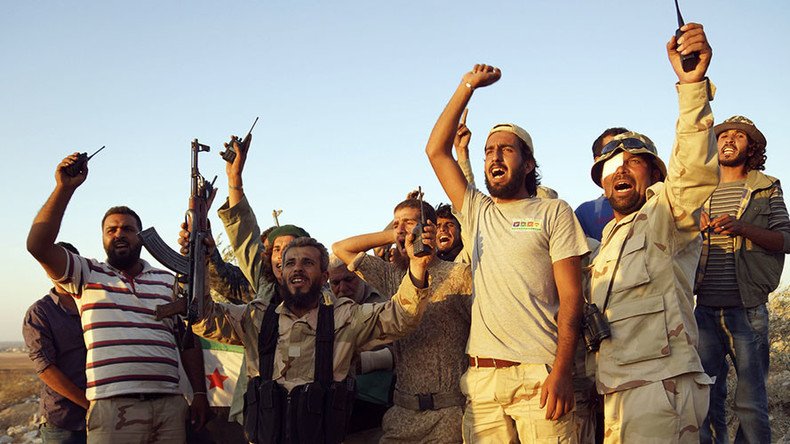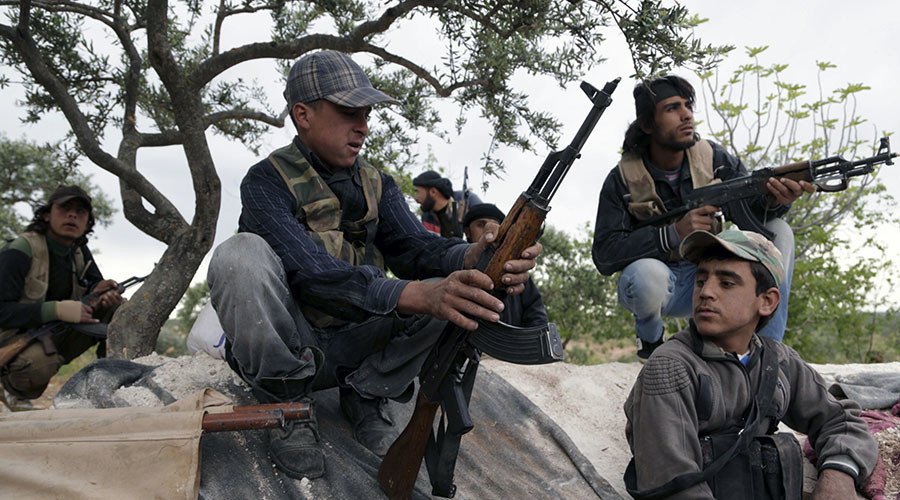Washington’s new & improved plan for Syria: ‘Sunni-stan, a safe zone for terrorists’

The US and its allies want to chip off a piece of Syria and a piece of northern Iraq to create a kind of canton, which will ultimately be completely dependent on those powers that created it, says geopolitical analyst Patrick Henningsen.
Now, Washington is considering the Turkish government’s request to re-launch a US program to train so-called moderate rebels in Syria. If it’s approved this would be the third American training program attempted in Syria.
RT: The US has assisted in the training of so-called moderate rebels in the past - with mixed results. Do you think Washington has come up with a better strategy this time?
Patrick Henningsen: This is a war strategy at least for the Syrian people. I think the previous plan wasn’t so much embedded inside Syria. This proposal is basically deriving from a US military and foreign policy talking point that we have a problem of extremists leaving Syria and going through Turkey and traveling internationally. So that is the so-called problem in terms of a talking point. This was underlined by the recent bombing in Istanbul, which killed a number of Germans coincidentally.
The real problem is Turkey has never made any effort to secure its border, it is absolutely porous and terrorists are allowed to travel in and out of Turkey and have been since 2011. So this new policy is at worst to train Sunni fighters inside Syria, inside what they hope to become a safe zone. And what all this does is reinforce the status quo for Turkey. They don’t have to change any of their behavior, and the problems will continue because of it.
RT: Over the last few months, the US and Ankara have pledged to seal the Turkish border with Syria numerous times. But so far very little progress has been made on this. Is the task really that difficult?
PH: Well, you have to look at the big picture here, and there is a lot going on behind the scenes that doesn’t really get reported, or people aren’t connecting the dots. What you have here is a situation where the West and the coalition, including the GCC [Gulf Cooperation Council] countries specifically Saudi Arabia, Qatar and the others, as well, and Turkey and the whole NATO confab - they failed to remove President [Bashar] Assad, and they failed to collapse the country of Syria. In lieu of this, what they are doing now is just basically moving to take territory. And from this new territory, which will be a kind of a de facto Sunni state - and I am not just saying this, this is what John Bolton has said in a recent New York Times OPED before Christmas – is to create a Sunni state. This is what everyone is talking about in muffled tones in Washington right now: a new ‘Sunnistan’. It is not going to be a safe zone for the Syrian people; this is going to be a safe zone for terrorists. And if you look at the amnesty program that the Syrian government is doing right now, this would provide a place for the amnesty terrorists to go and flee, lay siege to Syria from a safe, internationally-recognized Sunni state. So this is what is going on behind the scenes between Washington, London, Paris, and Riyadh.
RT: Do you think the US has softened its stance on Bashar Assad?
PH: It has been politically convenient to sort of back off of what looks like a losing PR effort – and it has been an absolute loss for the West. They have been demonizing Assad for a number of years now, and his public approval rating within Syria is just getting higher and higher because the Syrian people are looking to him for real leadership, and it’s being shown. This is flying in the face of all the propaganda coming out of Washington and London.
So they are not softening their stance at all. What they are doing now is regrouping. The interesting thing is that the deal that has been struck between Turkey, the US, and the Kurdish regional government – that new deal is really the bulwark of what we’re going to see with them trying to establish this new Sunni state. So they are going to try to chip off a piece of Syria and a piece of northern Iraq to create this kind of canton, if you will, which will ultimately be completely dependent on those powers who created it. They decry the mapmaking exercises after WWI, but yet the same powers are involved in redrawing the maps again in further benefit for the next generation.

No excuse for Syrian opposition to avoid elections and peace talks
Investigative journalist Tony Gosling said that Riyadh Hijab of the ‘Syrian opposition’ should start fighting elections in Syria like everybody else in the civilized world does.
Former Syrian prime minster Riyadh Hijab, who is now part of the Syrian opposition team, accused Washington of softening its position on Syria. He also said that due to the US government’s backtracking, the UN adopted a resolution in December that ignored the issue of President Bashar Assad’s fate.
RT: Why is the US considering training Syrian rebels at all? Do they think they can come up with a better strategy the second time round?
Tony Gosling: I hope so. Because of the upcoming elections, there is a little bit of pressure on the Americans to come up with a coherent policy here. But I am afraid there is one thing they can do with Riyadh Hijab from the rebel groups as a part of this negotiation process, which is to laugh at him. He is called ‘the opposition’ in the Western media, but he is now saying that he may not even turn up to the peace talks. I would suggest that if he wants to be the opposition that he should start fighting elections in Syria like everybody else in the civilized world does. We have parliamentary elections in 2012 that he possibly could have fought. Also, of course, presidential election in 2014 he could have fought. If he holds his horses and bides his time, the new constitution means Assad has only got two terms anyway. So why on earth does he not engage with the peaceful electoral process? That is what I think should happen here. And there is really no excuse for him to not turn up at these peace talks.
RT: What has changed on the ground in Syria? Will something change if the US gives its support?
TG: There has become a big difference between the foreign policy as it is being sold to the public here in the West, and what is really going here on the ground. Many of us have been told that it is a battle going on in Syria with ISIS.
Actually, what is happening behind the scenes is a battle for Syria, for the heart and minds. And America is slowly in a position where it is having to abandon some of its support for these rebels. It is becoming pretty clear that there is very little difference between [rebels] and ISIL/ISIL/DAESH. In fact what they are doing are trading with each other, exchanging weapons – some of the groups. And we’ve even had a senior general saying that we should be supporting al-Qaeda in Syria.
I think that they’ve got to go to these peace talks if we want any kind of real solution here, because actually the Americans are backtracking a bit and are realizing that their support for the rebels doesn’t make sense in military terms, never mind the propaganda.
RT: Turkey and the US have been trying to seal the border with Syria for months now with little progress. What is making this job so difficult?
TG: What makes it most difficult is that you have got a lots of interest in Turkey in keeping that border open, infiltrating agents through one way or another, and also keeping some of the oil supplies running, which Russia has been concentrating on thwarting those supplies going through. So we’ve got double dealing from the Turkish Erdogan government, who even has been talking about Hitler’s regime as a good way of running things… I think Turkey is in a kind of meltdown. They can’t make any clear coherent policy either and that’s another casualty of the next-door war in Syria.
The statements, views and opinions expressed in this column are solely those of the author and do not necessarily represent those of RT.












